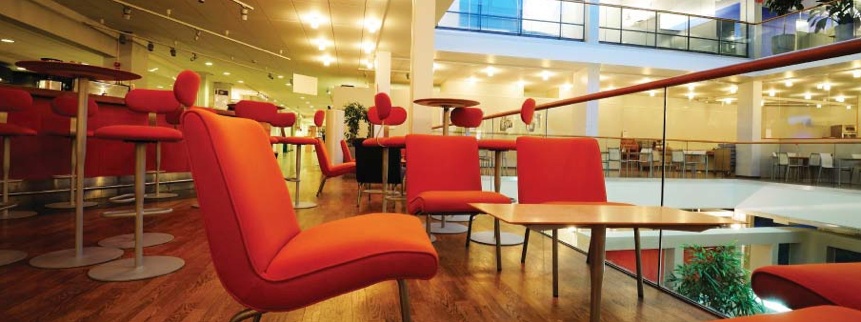
When the clock hits noon, my Preston Center colleagues and I usually walk across the street to grab something that’s fast and relatively cheap. One turkey on wheat (hold the mayo), a bag of chips, an iced tea, and $10 later, I’m back at my desk responding to emails within 20 minutes.
But many workers in North Texas aren’t as fortunate. If you’re in Far North Dallas, you’re likely jumping in the car and driving at least 10 minutes for lunch. Downtown Dallas tenants probably hit the tunnels for often sub-par food or, again, drive at least 10 minutes for a meal.
To solve this problem, many North Texas companies are opting to enhance the dining experience in-house. Jones Lang LaSalle recently completed transaction and project management services to help two law firms—Hallett & Perrin and Sonnenschein— achieve this goal. Especially with several buildings shuttering café services, many law firms are choosing a different solution to the dining dilemma. They’re reinventing the lunch model in-house, to reduce costs and increase productivity. These new-and-improved lunch rooms don’t look anything like your average high school cafeteria.
Could your company or your client’s company benefit from an enhanced and expanded lunch room? Here are some important points to consider:
• Businesses are starting to incorporate a food service offering in their office spaces in varying sizes, depending on the needs of the firm. In our experience, those with 125 lawyers are can support a food preparation area and the associated costs.
• Firms are consolidating all eating areas into one location where staff can socialize.
• In today’s fast-paced environment, firms are bringing food in for daily lunch meetings. Now, those with cafeterias can host meetings with meals prepared in-house to reduce costs and eliminate the need for outside catering.
• By controlling food-service preparation, firms can reduce administrative duties and increase menu selections and food quality.
• Most cafeterias are operated by outside vendors that provide staffing and purchasing, which significantly reduces costs.
• If employees eat on-site, they save time spent traveling to a restaurant.
• Retention of personnel increases, because people feel more connected to the firm, creating additional savings in recruitment and training.
• Cafeterias we see today don’t operate like the ones we grew up with. They serve multiple purposes. To fully leverage the space, tables and chairs need to reconfigure easily and you need the ability to separate areas within the space with utilizing moveable panels or doors.
• Natural light and ample space provides a comfortable environment for young associates whose workspace may be without windows. WiFi, televisions, and a unique décor differentiate the space, creating an almost coffee-bar-like atmosphere.
So … will the lawyers and staff dine together? Let’s face it—we all enjoy a break in the middle of our day. If lawyers need to talk confidentially, they’ll find somewhere else. The same goes for the staff. A good middle ground is to have private dining rooms adjacent to the cafeteria, where space can be reserved for private gatherings.
For many firms—and companies of all kinds—the new cafeterias have become an ultimate social center. The opportunities lunchrooms provide continue to grow as companies discover new and interesting ways to incorporate them into daily work life. Moving into the future, it’s likely that these cutting-edge cafeterias will continue to evolve into the centerpiece of a firm’s office space.





